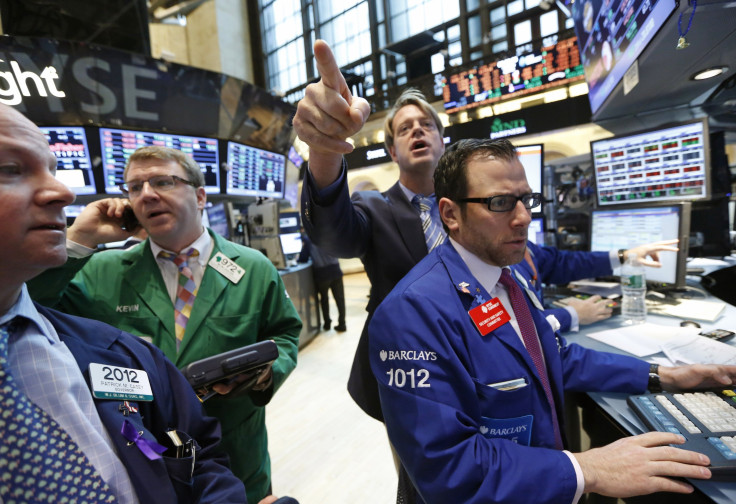Debt Ceiling Debate 2013: Default Deniers’ Plan Raises Legal, Logistical Questions

With the debt limit deadline a week away, there is a strong contingent of Congressional Republicans and conservative-policy shop analysts in Washington who deny that the U.S. will default if the debt ceiling is not raised.
“We have 10 times as much tax revenue as we’ve got annual interest on the debt obligations,” said Rep. Mo Brooks, R-Ala. “So if the president does not want us to default on our credit or obligations, we won’t.” If the government stops all payments except those on interest on the debt, Brooks and his colleagues believe, then the country won’t default.
But it’s a flawed plan for many reasons, not the least of which is that it's based on a false assumption. Also, it's illegal.
By the numbers, what Brooks and many of his fellow Republicans are saying is true: The Treasury brings in about $2.5 trillion in revenue each year and pays out $250 billion in interest on the debt. The problem comes with defining "default" as limited to interest payments to bondholders while excluding the numerous other debts the government owes to people and organizations.
“It’s sort of like saying, ‘if I pay interest on my mortgage, I’m not defaulting,’” said Richard Kogan, a senior fellow at the left-leaning Center for Budget and Policy Priorities. “Even if you’re not paying your credit card, you’re not paying your credit card company, you’re not paying your heating bill and you’re not paying your water bill. You certainly are defaulting, just not to everybody.”
Interest payments on the national debt are one kind of payment the federal government is obligated to make. It is also obligated to pay Social Security recipients, salaries owed to federal workers, payments to contractors, and payments to disabled veterans, among many others. “If you’re not making payments that are legally required by law, you are defaulting,” Kogan said. “You may not be defaulting to bond holders, but you are absolutely, positively defaulting.”
Over the next few weeks, however, the Treasury would have to default on these payments in order to hoard the cash necessary to make its interest payments. Otherwise, the government will run out of money later this month.
Then there’s the legal hiccup to the default deniers’ plan. Even though the government could in theory withhold payments to everyone but the nation’s creditors in order to meet its interest payments, it is legally obligated to pay everyone from contractors delivering army supplies to Social Security recipients. So it would have to illegally withhold payments in order to keep the money. It’s unclear whether the Treasury is willing to engage in that illegal activity in the event Congress doesn’t raise the debt ceiling in time.
Lastly, there’s a serious question about whether it is technically possible to only make interest payments and withhold the rest. The last time the United States defaulted on some payments, it was 1979, and the default occurred when Congress stalled on lifting the debt limit, creating a chaotic situation that led to an unintentional technical error.
“Our understanding is that they have a separate computer system set up, called Fedwire, to pay the interest on federal debt, and that they should be able to continue paying that even if they are not meeting their other obligations,” said Shai Akabas, a senior policy analyst at the Bipartisan Policy Center, which has run calculations on when the U.S. might default based on when various payments over the next several weeks are due. “But again, this is an unprecedented act, so we don’t know if there are additional complications that could occur.”
Akabas cited the 1979 incident, and its long-term cost of many billions of dollars in higher interest rate payments, that resulted: “Uncertain things can happen in an environment that has been untested.” It would be playing with fire.
Of course, all of the decisions above would have immediate consequences. For instance, when the Treasury goes to roll over its maturing bonds amid a default scenario, it’s likely that buyers will request higher interest rates, costing the government more money down the line, as happened in the 1979 incident. It’s also possible, though less probable, that in the midst of a default, there simply might not be enough buyers to roll over the debt. According to the Bipartisan Policy Center, Treasury will roll over at least $302 billion in federal debt between Oct. 15 and Oct. 31.
There is the market reaction to worry about, too. Even if the government were to stave off a worldwide crisis by paying bond holders at the expense of seniors and veterans, it’s unlikely that the markets would stay calm. It’s also unlikely that citizens would stay calm when they realized China was getting its checks but they weren’t.
Treasury Secretary Jack Lew will be asked to weigh in on the question of whether his agency can actually withhold everything but interest payments when he appears before the Senate Finance Committee on Thursday. “The United States should not be put in a position of making such perilous choices for our economy and our citizens,” Lew said recently according to speech excerpts obtained by the Washington Post. “There is no way of knowing the irrevocable damage such an approach would have on our economy and financial markets.”
But political and economic effects aside, there are serious logistical and legal questions about whether the government could actually do what the so-called “default deniers” are suggesting: pay bond holders and tell everyone else to wait, indefinitely.
© Copyright IBTimes 2024. All rights reserved.












